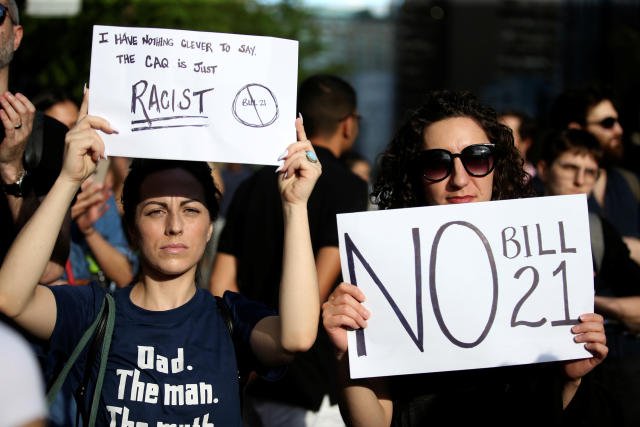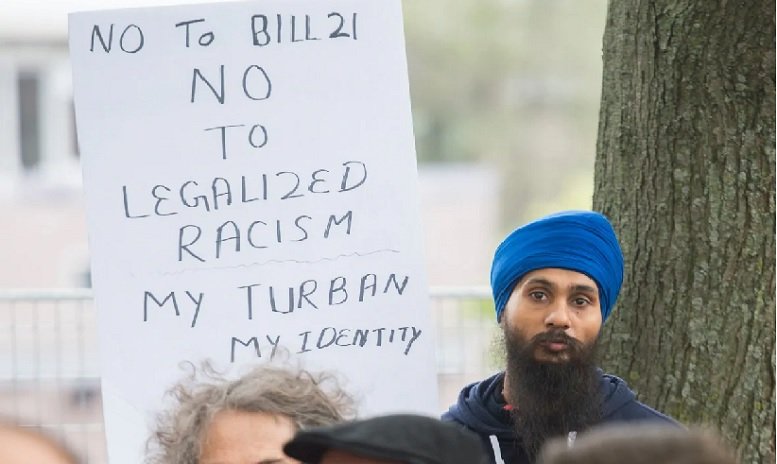By Harinder Mahil
The Supreme Court of Canada on January 23 agreed to hear a challenge of Quebec’s “secularism law”, known as Bill 21, which prohibits public sector workers in positions of authority from wearing religious symbols on the job.
This law prohibits turban wearing Sikhs or hijab-wearing Muslim women from being hired as judges, teachers, police officers and prison guards. The law prohibits public sector workers from wearing religious symbols while at work. The legislation does not specify religious symbols that are prohibited at work, but critics say it disproportionately affects Sikhs and hijab-wearing Muslim women.

The legislation forces people to choose between their careers and their faith. It is a blatant violation of religious freedoms, a right protected under the Charter of Rights and Freedoms.
Although freedom of expression and religion are enshrined in Canada’s constitution, provincial and federal governments can set aside certain rights in favor of their own policy objectives, through the rarely used “notwithstanding clause.” The clause was adopted in 1981 as something of an override button after provinces expressed concern that they would have to cede authority to the courts to interpret some rights.
Quebec’s National Assembly passed the bill into law on June 16, 2019. To protect the law from the courts, Quebec legislators invoked the Constitution’s notwithstanding clause, a provision that must be renewed every five years. It was last renewed in 2024.
The federal government has said it would intervene in the case and make arguments against the law in front of the Supreme Court.

The decision by the Supreme Court of Canada to grant leave to appeal is an important opportunity to examine the fundamental protections for religious minorities and the limits of the notwithstanding clause in a case where it has been weaponized to override fundamental freedoms and disproportionately target members of certain religions.
By using the notwithstanding clause within the Charter to shield Bill 21 from legal challenges, the Quebec government set a precedent for politicians to attack Canadians’ rights without fear of consequence.
Since the law came into effect, many members of Sikh and Muslim communities have lost their jobs and had the leave Quebec. The law infringes upon individuals’ rights to freely practice their religion.

The law is discriminatory, as it targets specific religious groups. It marginalizes these communities and unfairly stigmatizes them as being “other.”
Human rights advocates say the law contributes to social divisions within Quebec society. They argue that it fosters an atmosphere of intolerance and exclusion and may deepen existing divides between different cultural and religious groups, making it harder for people to live together harmoniously.
People should not be forced to make the choice between their religion, their identity and their profession. The government should not be allowed to impose their beliefs on the people of Quebec, nor should they be dictating to individuals what they can and cannot wear.
I hope the Supreme Court will see the law as discriminatory and suspend its operation.

Harinder Mahil is a human rights activist and is secretary of Dr. Hari Sharma Foundation.







3 Comments
jokerbet güncel
2 days agoHey there You have done a fantastic job I will certainly digg it and personally recommend to my friends Im confident theyll be benefited from this site
jokerbet
2 days agoSomebody essentially lend a hand to make significantly posts I might state That is the very first time I frequented your web page and up to now I surprised with the research you made to create this particular put up amazing Excellent job
jokerbet güncel giriş
2 days agoYour blog is a true hidden gem on the internet. Your thoughtful analysis and engaging writing style set you apart from the crowd. Keep up the excellent work!